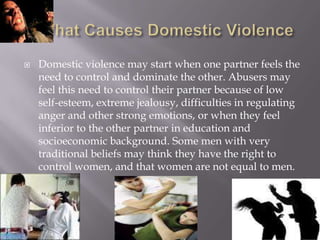Group proj domestic violence against.
- 1. Veronica Sarah Krystal Group 5
- 2. What is Domestic Violence What causes Domestic Violence Who can it happen to What are the signs that tells someone you know or you are a victim of Domestic Violence How can you get help Can Domestic Violence be prevented
- 3. Domestic violence is where one person tries to control and assert power over their partner in an intimate relationship. It can be physical abuse, emotional abuse, sexual abuse or financial abuse.
- 4. Domestic violence may start when one partner feels the need to control and dominate the other. Abusers may feel this need to control their partner because of low self-esteem, extreme jealousy, difficulties in regulating anger and other strong emotions, or when they feel inferior to the other partner in education and socioeconomic background. Some men with very traditional beliefs may think they have the right to control women, and that women are not equal to men.
- 5. Sad to say Domestic Violence can happen to anyone. Your mother, sister, aunt, niece, grandmother, daughter, even YOU! Domestic Violence DO NOT exempt us because of our ethnicity , religion, size, or strength.
- 6. Domestic abuse often escalates from threats and verbal abuse to violence. While physical injury may be the most obvious danger, the emotional and psychological consequences of domestic violence are also severe. Emotionally abusive relationships can destroy your self-worth, lead to anxiety and depression, and make you feel helpless and alone. No one should have to endure this kind of pain and the first step to breaking free is recognizing that your situation is abusive. Once you acknowledge the reality of the abusive situation, then you can get the help you need.
- 7. extreme jealousy or insecurity constant put-downs possessiveness or treating you like property telling you what to do constantly checking in on you explosive temper making false accusations isolating you from your friends and family preventing you from doing things you want to do
- 8. There are many organizations that can provide counseling, legal services, and supportive services, including advice on how to break up with an abusive partner, assistance with housing relocation, and school safety transfers. Many hotlines are available 24/7. Think about how you feel about reporting the abuse to the police or getting an Order of Protection. You may want to report this person to prevent future altercations also to prevent them from hurting someone else. Think about whether there is a friend, parent, teacher or counselor you can confide in. Abusers often manipulate their partners by isolating them from friends and family members. Don't stay silent, speak to someone that you trust. Be as honest and open as you can be about what is happening.
- 9. Helping someone you know who is in an abusive relationship can be one of the most difficult things you ever do, and it is not always easy. But supporting someone who is being abused can help save a life, and there are ways you can provide support without contributing to the danger. Listen and acknowledge that the abuse are in a very difficult and scary situation. Encourage the person to talk about the situation with a trusted adult or professional. Help develop a safety plan.
- 10. Blame the victim for the abuse. Domestic violence is NEVER the victim's fault. Force or pressure someone to leave a relationship if she is not ready to, or does not want to leave. Share what is happening with someone else if your friend has asked you not to. Use your best judgment if you think someone's life is in danger. But be sure to tell your friend what you are doing. Assume the person is fine after the relationship is over. She will probably feel sad, lonely, and confused, and you should continue to provide support. Make your friend feel bad for any decisions. Forget to check yourself. If you find yourself becoming very frustrated or upset the situation, know when to take a time out or step back. Be honest about this with your friend.
- 11. The only real way to prevent domestic violence is not to get involved with a person who has an abusive personality. Abusive behavior is not an act of rage. It is also not caused by substance abuse. It is a personality disorder and the chances of stopping a person from resorting to violence is so slight. The only thing you can do to safeguard yourself is to end the relationship before it is too late. No one goes into a relationship thinking it would turn out abusive, learn and be aware of your warning signs and get help for yourself or someone you suspect is in an abusive relationship.










